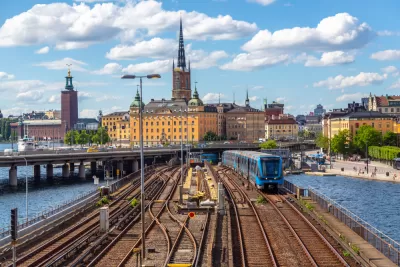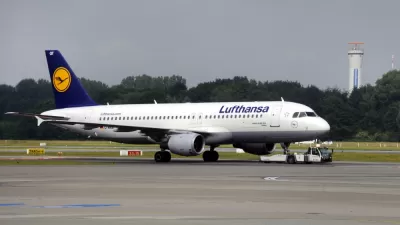A greener life means fewer flights for many Europeans.

Lisa Abend reports on the growing popularity of train travel over air travel among an increasingly eco-conscious European population:
This is the season of flygskam, or “flight shame.” You don’t have to be Greta Thunberg, the teenage climate activist who recently announced plans to sail to New York in August, to recognize that a growing number of Europeans eager to reduce their carbon footprint are opting to limit air travel in favor of more environmentally-friendly means of transportation.
The counterpart of flygskam is tagskryt, or train-bragging, notes Abend. European counties and private rail companies are responding the new cultural milieu by considering the return of long distance night-time trains.
The cultural trend is aided by two grassroots initiatives: "Flygfritt, which convinced 14,500 Swedes to renounce air travel in 2019 (it’s shooting for 100,000 in 2020) and Tagsemester, a Facebook group with nearly 100,000 members, that offers information on how to travel by train."
In case the Swedish origin of the word might imply that the trend is confined to the Scandinavian states, Abend also expands the purview of the discussion:
Yet Sweden isn’t the only place feeling the effects of flygskam (in fact, the Dutch, Germans, and Finns have their own words for it). Flygfritt now has chapters in the UK, France, and Germany and according to Eurail and Interrail General Manager Carlo Boselli, flygskam is influencing the decision to purchase the rail passes (which allow for cross-border travel anywhere on the continent) as well.
The movement has enough traction in Germany, for instance, that the Alliance 90/The Greens political party recently announced a plan to replace domestic air travel with train travel by 2035.
FULL STORY: In Europe, the Movement to Give Up Air Travel Is Taking Off. Could the U.S. Be Next?

Maui's Vacation Rental Debate Turns Ugly
Verbal attacks, misinformation campaigns and fistfights plague a high-stakes debate to convert thousands of vacation rentals into long-term housing.

Planetizen Federal Action Tracker
A weekly monitor of how Trump’s orders and actions are impacting planners and planning in America.

In Urban Planning, AI Prompting Could be the New Design Thinking
Creativity has long been key to great urban design. What if we see AI as our new creative partner?

King County Supportive Housing Program Offers Hope for Unhoused Residents
The county is taking a ‘Housing First’ approach that prioritizes getting people into housing, then offering wraparound supportive services.

Researchers Use AI to Get Clearer Picture of US Housing
Analysts are using artificial intelligence to supercharge their research by allowing them to comb through data faster. Though these AI tools can be error prone, they save time and housing researchers are optimistic about the future.

Making Shared Micromobility More Inclusive
Cities and shared mobility system operators can do more to include people with disabilities in planning and operations, per a new report.
Urban Design for Planners 1: Software Tools
This six-course series explores essential urban design concepts using open source software and equips planners with the tools they need to participate fully in the urban design process.
Planning for Universal Design
Learn the tools for implementing Universal Design in planning regulations.
planning NEXT
Appalachian Highlands Housing Partners
Mpact (founded as Rail~Volution)
City of Camden Redevelopment Agency
City of Astoria
City of Portland
City of Laramie





























